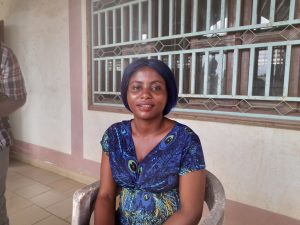Ekondo Titi – a district in the Southwest region of Cameroon, accessible only by boat and difficult dirt roads – has a high rate of malaria. Here, access to healthcare and essential information on disease prevention and treatment is severely disrupted by continued violence and insecurity. This affects people living in districts across the Lake Chad basin, Northwest and Southwest region, who rely heavily on the community health system.
In Cameroon, malaria is a leading cause of morbidity and mortality, with a 24 percent prevalence and 28 percent of child mortality. The ongoing civil war has led to the closure of over 35 percent of health facilities and an estimated 160,000 people have been displaced, making it harder to seek treatment. Through the Improving access to malaria case management for conflict-affected populations in Cameroon project we are exploring the use of three innovative community engagement interventions to strengthen malaria prevention and control and to improve quality of malaria care in conflict-affected areas of the country.
The project is being delivered by the country’s National Malaria Control Programme (NCMP), Reach Out Cameroon and Konmofamba Action Sans Frontière (KASAFRO). Malaria Consortium is providing technical support to embed the Community Health Participatory Approach (CoHPA), supportive supervision of community health workers (CHWs) and a voucher scheme to subsidise malaria treatment and transport for severe forms of malaria, requiring hospital care. Our goal is for CHWs to provide community-based malaria case management and reach people who are internally displaced with essential healthcare.
What is participatory health promotion?
The Community Health Participatory Approach (CoHPA) is the name given to the community dialogue approach to support prevention and control of malaria. CoHPA was developed by Malaria Consortium and is based on the Integrated Model of Communication for Social Change (IMCFSC) – an iterative process of community dialogue and collective action working together to produce social change in a community that improves the health and welfare of all.
Community-based volunteers are trained to facilitate regular meetings where specific health issues affecting the community are explored, local solutions are identified, and participants collectively decide and plan how best to address the issue. The approach is embedded within existing community and health structures which help to strengthen accountability and provide oversight. It is designed to empower individuals to take ownership of their health, and over time strengthen the relationship between communities and health service providers. This approach has been used successfully in multiple contexts to improve the uptake of health services and promote the adoption of positive health behaviours for a range of other health issues.
How can this work in practice?
In Ekondo Titi, community leaders organised CoHPA community dialogues with a breadth of representation, ensuring that information was shared with every household. Local people, with extensive knowledge of the local community and understanding of the challenges faced by health workers and communities alike, were recruited as community volunteers to lead the sessions. Through asking questions, sharing their experiences and engaging in activities, participants agreed a plan of action to improve the well-being of their community.
In focus groups and interviews earlier this year, communities and health staff involved in the project shared their feedback on the dialogues:

Batty, a community volunteer, commented: “I enjoyed the meetings where I could ask questions and have them answered directly. I learnt what the meeting participants knew about malaria, how to treat it and how to prevent it”.
“Adult learning is the most important thing I learnt. I had heard of this before, but had never studied it” added Sylvester, Field Supervisor.
“The best thing about the meetings are the volunteers and participants raising awareness and doing my job, people think of malaria when they and their children have symptoms of high temperature and vomiting” said John, Community Health Worker, Njima, Ekondo Titi.
What has changed?
For families in this community, health services have improved because health staff have received training in communication, facilitation and using mosquito nets. They learnt about non-verbal language and how to ensure that everyone participated. The groups learnt to prepare materials and use the right words in local languages.
The transport referral and voucher system has also enabled seriously ill children, pregnant women and other vulnerable people – including those who are displaced, elderly or living with disability or chronic diseases – to access free treatment for malaria and all serious disease. This provides an essential lifeline for the remote communities such as those living in Ekondo Titi, where access to healthcare is difficult and expensive.
Women and young people in this community have been instrumental in action planning and helping everyone to put up and maintain mosquito nets, including the elderly and people living with disability. Displaced households were assisted to access bed nets and clear away any stagnant water and there are now plans to distribute nets to farmers for use in their farming huts, protecting them from malaria infection whilst they sleep.
What’s next?
Malaria Consortium continues to learn from communities and health staff involved in these dialogues and apply this learning to further strengthen its approach. The development of a community dialogue manual for this project is underway, which will help to ensure that the appropriate resources are available to share this knowledge and encourage active participation in community dialogues in the long term. We are also monitoring the project and supporting data analysis efforts to be able to share findings, progress and recommendations with the Ministry of Health in Cameroon, so that this approach can be utilised and implemented more widely across the country.
Elizabeth Berryman is Malaria Consortium Senior Technical Advisor